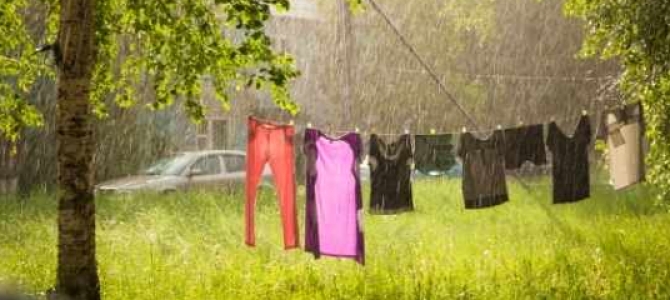 Shopping Cart
Shopping Cart
12 February 2026
Is rainwater clean for laundry?

Yes, rainwater is clean and safe for laundry when it is properly collected and filtered. Rainwater is naturally soft, contains fewer dissolved minerals than most mains supplies, and is widely used for washing clothes in New Zealand, Australia, and parts of the United States. The main risks are not the rain itself but airborne pollutants, roof contaminants, and prolonged dampness that can lead to odour. With modern filtration and smart water monitoring, rainwater is often better for clothes, washing machines, and long-term water efficiency than treated mains water.
When Rain Ruins Your Laundry Plans
We’ve all been there. You look at the weather forecast in the morning, and there is not a raindrop in sight – a perfect day for drying your washing outside, but sure enough, as soon as you leave the house and you’re out of sight, the heavens open and the rain begins to fall.
The big question when you get home is what to do next. Do you rewash the entire load, or do you just wait for it to dry and treat it as normal? Will the rainwater have made your clothes dirty or smelly, or is it just like another rinse cycle?
The truth is, there is no right or wrong answer to this age-old question. In the end, it comes down to personal preference as well as some other factors that might impact the cleanliness of your washing after it gets soaked by rain, including:
· How long it was hanging in the rain
· The wind direction
· Any road works or building work going on near your property
· Where you live
Is Rainwater Itself Clean?
From a chemical perspective, rainwater starts out very clean.
Rainwater forms when water vapour condenses in the atmosphere. It contains very low levels of dissolved minerals, which makes it naturally soft. Soft water lacks high concentrations of calcium, magnesium, iron, and manganese that are commonly found in mains water supplies.
Depending on where you live, your mains water could be a much harder water that needs to be treated to decrease the hardness. Soft water does not contain dissolved materials and minerals such as calcium, magnesium, iron, and manganese so theoretically, when it rains, that water is clean enough that there should be no negative impact.
This softness matters because:
- Soft water allows detergents to dissolve more efficiently
- Fewer minerals means less residue on clothes
- Fabric fibres experience less abrasion over time
- Washing machines suffer less scale buildup
According to water quality agencies in New Zealand, Australia, and the US Environmental Protection Agency, rainwater is suitable for non-potable uses such as laundry when appropriately collected and filtered.
The rain itself is rarely the issue.
What Can Contaminate Rainwater Before It Reaches Your Clothes?
The problem is that on its way to the ground, it can pick up pollutants and contaminants in the air.
Airborne Pollutants
As rain falls, it can absorb airborne particles such as:
- Dust and pollen
- Vehicle emissions
- Industrial pollutants in urban or industrial zones
These risks are higher near busy roads, ports, factories, and mining areas. Rural locations may experience agricultural dust or pollen instead.
Wind-Blown Dust
Even without rain, wet clothes on a line can attract dust. Rain can increase this risk by keeping fabrics damp for longer, allowing particles to adhere more easily.
Areas most affected include:
- New housing developments
- Unsealed roads
- Farming and forestry regions
- Quarry or mining zones
Wind direction often matters more than rainfall volume.
Why do my clothes smell if they get rained on?
Often, people who are in the ‘rewash the load’ camp will complain that their washing smells after it has been left out in the rain; however, the truth is that any washing that is left damp for too long will start to smell.
This is because a damp and warm environment encourages the growth of bacteria and mould and this is what generates the musty smell on your clothing. It’s no different to forgetting you put a load of washing on and then letting it sit damp in the machine for hours, or even days. That washing always comes out smelling musty, even after a couple of hours and often needs rewashing.
Again, if there is a short rain shower and then your washing dries straight away, it is highly unlikely it will smell any different to how it would without the rain. If you choose to leave it out on the line for a couple of days through a series of rain showers, it is likely to develop the musty smell that will mean it needs rewashing.
What about rainwater harvesting for washing clothes?
Across New Zealand, Australia, and the United States, rainwater harvesting is becoming increasingly popular, especially for people who want to use it for activities like flushing the toilet, washing clothes, and watering the garden in the summer.
Whilst rainwater can collect pollutants as it falls to the ground, as well as picking up pollutants from the roof before it is collected in a rainwater tank, most rainwater tanks, even those that are not used for potable purposes (drinking, cooking etc), are fitted with a filtering system so the water that comes out is not the same as the water you collect. Micro filters collect even the smallest particles of dust and debris, meaning the water you collect from your roof is perfectly safe for washing clothes in your washing machine.
As we have already touched upon, the acidic nature of rainwater means that is it also a soft water which is better for washing clothes than a harder water and less hard wearing on your washing machine and parts.
Key Advantages of Rainwater for Washing Clothes
- Naturally soft, reducing detergent requirements
- Less mineral residue on fabrics
- Gentler on washing machine components
- Lower long-term maintenance and repair costs
- Improved washing performance for dark and delicate clothing
In contrast, hard mains water often requires chemical treatment and can lead to scale buildup in heating elements, hoses, and pumps.
Studies from Australian water authorities show households using rainwater for laundry can reduce detergent use by up to 50 per cent compared to hard mains water areas.
Collecting rainwater in in New Zealand, Australia and the US
Rainwater is a great way to supplement your mains water supply, no matter where you live, and for many properties, it is quickly becoming the main source of water to a property.
Washing your clothes with rainwater is a great way to conserve water and cut down on your monthly bills. Whilst you will need to make adjustments to your water supply in order to hook up a rainwater tank to your washing machine and also for flushing your toilets, the short-term costs will pay for themselves over time as you no longer need to pay for the water you use to wash your clothes or flush the toilet.
If you have a young family, the washing machine can run every single day and collecting rainwater from your roof is a great way to keep costs down.
Is Rainwater Safe for Washing Machines?
Yes, provided it is filtered.
Rainwater is compatible with all modern washing machines, including front loaders, top loaders, and high-efficiency models.
In fact, appliance manufacturers often note that soft water extends machine lifespan by reducing scale buildup. This is especially relevant in Australia and the western United States, where hard water is common.
Water Efficiency, Cost Savings, and Sustainability
Laundry is one of the largest indoor water uses in residential homes.
According to international water agencies:
- Washing machines account for 15 to 25 per cent of household water use
- Families with children may run machines daily
- Water costs continue to rise in Australia and parts of the US
Using rainwater for laundry can significantly reduce reliance on mains water and lower household water bills over time.
In drought-prone regions, rainwater systems also improve resilience during restrictions and supply disruptions.
Where Smart Monitoring Makes the Difference
One area most rainwater systems overlook is visibility.
Many households have rainwater tanks, but no clear understanding of:
- How much water is available
- How quickly it is being used
- When tanks are nearing empty
- How rainfall patterns affect supply
Smart water level indicators solve this problem.
Unlike basic float gauges, smart indicators provide:
- Real-time water level data
- Remote monitoring via mobile or desktop
- Early warnings before tanks run dry
- Better planning during dry periods
This is particularly valuable for households relying on rainwater for laundry, toilets, and irrigation across variable climates like New Zealand, Australia, and the US.
Regional Considerations: NZ, Australia, and the US
New Zealand
Rainwater is widely accepted for non-potable and potable use, especially in rural areas. Laundry use is common and supported by building and water guidelines when systems are correctly installed.
Australia
Rainwater harvesting is heavily promoted due to water scarcity. Many states encourage tank-to-laundry connections in new builds. Soft rainwater is often preferable to very hard mains water.
United States
Regulations vary by state. Rainwater is widely used for irrigation and laundry in states with progressive water conservation policies. Filtration and local compliance remain important.
Final Verdict: Should You Rewash Rain-Soaked Laundry?
In most cases, no.
If the rain was light and the clothes dried quickly, rainwater alone does not make laundry dirty. Odour and contamination risks are linked to dampness duration and environmental exposure, not rain itself.
When rainwater is intentionally collected, filtered, and monitored, it is one of the best water sources available for washing clothes.
You can read more about the basics of collecting rainwater here in New Zealand in our beginner’s guide to collecting and using rainwater. Here you will find handy tips on selecting the best rainwater tank for your needs as well as the process of filtering and connecting your rainwater tank to your property. You can also find out more information about Smart Water’s range of rainwater tank indicators – helping you to keep on top of your water usage and ensure you are maximising the rainwater you collect.
Frequently Asked Questions
Is rainwater safe to use in all types of washing machines?
Yes. Rainwater is naturally soft and compatible with all modern washing machines. Proper filtration prevents debris from entering the appliance and protects internal components.
Will rainwater affect the colour or quality of my clothes?
Filtered rainwater often improves washing results. Soft water helps detergents dissolve fully, reduces residue, and is gentler on fabrics, especially dark and delicate clothing.
Can rainwater reduce detergent usage?
Yes. Many households find they can use significantly less detergent with rainwater due to its low mineral content. This also reduces chemical buildup in clothes and machines.
Is rainwater suitable for sensitive skin or baby clothes?
Filtered rainwater is often well tolerated because it contains fewer minerals and chemical additives than treated mains water. Standard laundry hygiene practices still apply.
Do I need to treat rainwater before using it for laundry?
Basic filtration is sufficient. Potable treatment such as UV or chlorination is not required for laundry use unless mandated by local regulations.
